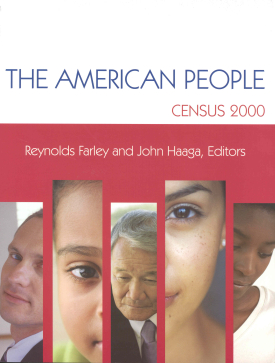
The American People
About This Book
For more than 200 years, America has turned to the decennial census to answer questions about itself. More than a mere head count, the census is the authoritative source of information on where people live, the types of families they establish, how they identify themselves, the jobs they hold, and much more. The latest census, taken at the cusp of the new millennium, gathered more information than ever before about Americans and their lifestyles. The American People, edited by respected demographers Reynolds Farley and John Haaga, provides a snapshot of those findings that is at once analytically rich and accessible to readers at all levels.
The American People addresses important questions about national life that census data are uniquely able to answer. Mary Elizabeth Hughes and Angela O'Rand compare the educational attainment, economic achievement, and family arrangements of the baby boom cohort with those of preceding generations. David Cotter, Joan Hermsen, and Reeve Vanneman find that, unlike progress made in previous decades, the 1990s were a time of stability—and possibly even retrenchment—with regard to gender equality. Sonya Tafoya, Hans Johnson, and Laura Hill examine a new development for the census in 2000: the decision to allow people to identify themselves by more than one race. They discuss how people form multiracial identities and dissect the racial and ethnic composition of the roughly seven million Americans who chose more than one racial classification. Former Census Bureau director Kenneth Prewitt discusses the importance of the census to democratic fairness and government efficiency, and notes how the high stakes accompanying the census count (especially the allocation of Congressional seats and federal funds) have made the census a lightening rod for criticism from politicians.
The census has come a long way since 1790, when U.S. Marshals setout on horseback to count the population. Today, it holds a wealth of information about who we are, where we live, what we do, and how much we have changed. The American People provides a rich, detailed examination of the trends that shape our lives and paints a comprehensive portrait of the country we live in today.
REYNOLDS FARLEY is professor of sociology at the University of Michigan and research scientist in its Population Studies Center. As author, editor, advisor, and interviewer to the U.S. Census Bureau, he has been an active participant in each of the last four censuses.
JOHN HAAGA is director of Domestic Programs and director of the Center for Public Information on Population Research at the Population Reference Bureau.
CONTRIBUTORS: Kenneth Prewitt, Sheldon Danziger, Peter Gottschalk, Liana C. Sayer, Philip N. Cohen, Lynne M. Caspar, David A. Cotter, Joan M. Hermsen, Reeve Vanneman, Dowell Myers, Daniel T. Lichter, Zhenchao Qian, William P. O'Hare, Mary Elizabeth Hughes, Angela M. O'Rand, Mary M. Kritz, Douglas T. Gurak, Frank D. Bean, Jennifer Lee, Jeanne Batalova, Mark Leach, Sonya M. Tafoya, Hans Johnson, Laura E. Hill, Rogelio Saenz, Michael A. Stoll, Yu Xie, Kimberly A. Goyette.
A Volume in the RSF Census Series
